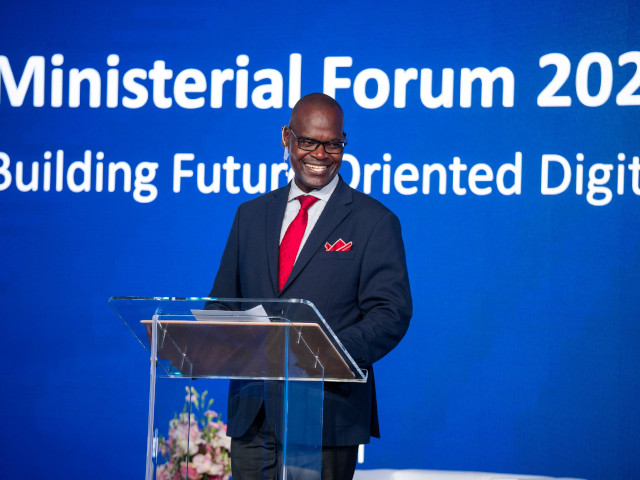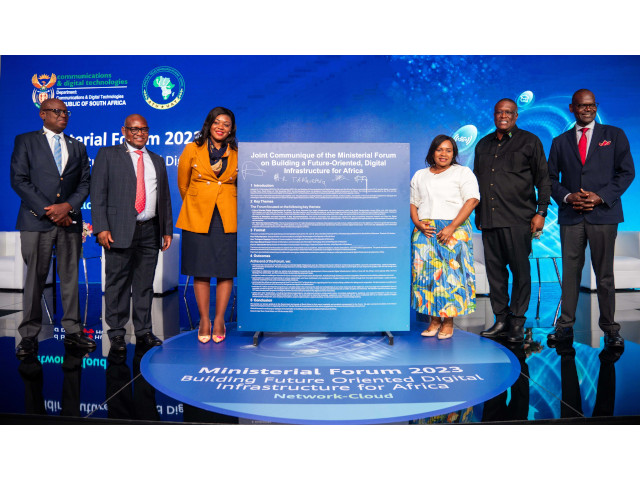Ministers of Communications and Digital Technologies and the African Telecommunications Union (ATU) member states, convened in Cape Town, South Africa, for the Ministerial Forum on Building a Future-Oriented, Intelligent Digital Infrastructure for Africa. The Forum was co-organised by the ATU and the Department of Communications and Digital Technologies (DCDT) of South Africa, with the aim of advancing the digital transformation agenda in Africa. The event concluded with the signing of a joint communique underlining the importance of collaboration between all stakeholders in building a future-oriented digital infrastructure for Africa.
Taking place alongside AfricaCom, the continent’s premier ICT conference and exhibition, the forum provided a platform for dialogue and an exchange of views on the development of a future-oriented intelligent digital infrastructure in Africa, which is essential for achieving the socio-economic development goals of the continent.
The event comes at a time when the development of the global digital economy has brought focus on the need for Africa to strengthen the construction of high-speed networks (4G, 5G and fibre), the implementation of high-performance cloud computing capabilities.

John Omo, Secretary General, African Telecommunications Union (ATU)
“In the space in which this forum operates, we have the ability to create consensus on which way to go in building future-oriented digital infrastructure for Africa,” said African Telecommunications Union (ATU) Secretary General, John Omo. “We know the place of digital infrastructure in the global arithmetic that defines the compass of progress. We also know that to find our bearing on this compass, we must be deliberate about the actions we take to protect the future of Africa.”
“I must note that it is also through the synergy of governments, private sector entities, research institutions, and international organisations that we can realise the full potential of our collective efforts,” he added. “What this means is that inclusivity should be a guiding principle as we shape the future of digital infrastructure. We must ensure that the benefits of technological advancements reach every corner of society, leaving no one behind.”
This focus on collaboration is something that the South African government especially has sought to cultivate. On a trip to China earlier this year, for example, Deputy President Paul Matashile commended Huawei for opening its Innovation Centre in Johannesburg. In an address, he pointed out that it, “promotes and facilitates collaborative innovation in the ICT sector among Huawei’s South African partners, application developers and SMMEs”.
“As we embark on this new era of technological advancements, it is essential for countries and organisations to work collectively and harness the power of innovation to address some of the most pressing global challenges,” he added.
South African Deputy Minister of Communications and Digital Technologies, Philly Mapulane further concurred with the need for collaboration by players across the sector.
“This gathering marks a significant milestone in our collective pursuit of a digitally empowered Africa,” he said. “We are here not merely as representatives of our respective nations and organisations, but we are here as architects of a shared vision — one that envisions an Africa propelled into a future where the possibilities of connectivity are boundless.”
“I’d like to extend my sincere gratitude to the ATU for entrusting South Africa with the privilege of hosting this significant gathering,” he added. “The collaboration with Huawei, a global technology leader, underscores the importance of international partnerships in shaping Africa's digital future.”
The need for collaboration was echoed by Nonkqubela Thathakahle Jordan-Dyani, Director-General in the Department of Communications and Digital Technologies, who attended the forum.
“As government, we’ve always looked to the best solutions that will respond to our country,” she said in an interview on the sidelines of the conference. “Our collaborations with Huawei have shown that its products meet those needs.”
Leo Chen, President of Huawei Sub-Saharan Africa, underlined how much progress the continent has made when it comes to building the digital infrastructure it needs while also outlining the areas that still need improvement. These improvements, he said, are best achieved through the One Network, One Cloud approach advocated by Huawei.
“To build One Network, countries should continue to build national broadband backbone networks to serve as the arteries of national network connectivity,” he said. “In addition, such backbone networks should be extensible across multiple domains.”
“This means they should be able to connect to different metropolitan area networks and campus networks,” he added. “Similar to a highly-developed neural network, they will connect the last mile of connectivity to meet the needs of different scenarios.”
According to Chen, the benefits of such a network would be considerable. Among the benefits he listed were increased GDPs for countries across the region, enhanced government service delivery, and improved connectivity for individual households. He also mentioned that due to the coverage gap on the continent, it is still important to cover more people through wireless connectivity technologies, such as 4G and 5G, and through rural connectivity solutions, such as Huawei’s RuralStar.”
In dissecting the “One Cloud” segment of the approach, Chen outlined how important cloud technologies have become at a nation-state level.
“The national cloud platform can serve as the foundation for a country's advanced technological innovation, and can greatly improve the capabilities of governments and enterprises to adopt new technologies,” he said.
“With the national cloud platform and cloud infrastructure, African countries can also unlock huge potential in the ‘e-government’ cloud,” he added. “One example from China can represent a future trend. In Shenzhen, where Huawei is headquartered, citizens can complete almost all of the government service items with at most one visit to the service office, or without even making a physical visit at all.”
According to Chen, “to implement One Network, One Cloud and ensure its steady progress, the governments of all countries should provide strategic guidance and support through specific policies.”
“As we continue our digital transformation journeys, it is important that we share our collective wisdom, vision, and resolve,” Chen concluded. “Thus, it is very important that we share different experiences and best practices across the continent when building the ‘One Network and One Cloud’.”
Other dignitaries echoed the importance of collaboration for the future of African digital infrastructure.
“It’s key that we work collaboratively to ensure that connection costs don’t become a barrier to connectivity for our citizens,” said Thulagano Merafe Segokgo, Minister of Communications, Knowledge and Technology, The Republic of Botswana. “If we are going to achieve connectivity at the level our citizenries deserve, we must work together.”
“Collaborating is an important aspect if we want to achieve our goals,” said Nape Moses Nnauye, Minister for Information, Communication and Information Technology, The United Republic of Tanzania. “Let’s see how we can work together and face the challenges together.”
“We need greater collaboration,” said Dr. T A Mavetera Minister of Information Communication Technology, Postal and Courier Services, the Republic of Zimbabwe, who added that this collaboration should extend beyond digital infrastructure and include things like skills transfer and policy formulation.
The communique, issued at the end of the gathering, committed the African countries present to, “collaborate and align our policies and strategies to promote the development of digital infrastructure in Africa, in line with the African Union Agenda 2063, the ATU Strategic Plan 2020-2024, and the United Nations Sustainable Development Goals” among other things.
In an example of the collaboration called for, the event also saw the presentation of the South African Fibre Broadband Development Initiative, a partnership between the Department of Communications and Digital Technologies (DCDT), the Digital Council Africa (DCA) and Africa Analysis, it's a position paper titled Toward a Gigabit Society in South Africa. The paper analyses the positive impact that increased fixed broadband adoption will have in SA from a social and economic perspective. It outlines the current status and challenges, and proposes recommendations on strategy and policy interventions to turn South Africa into a gigabit society.





